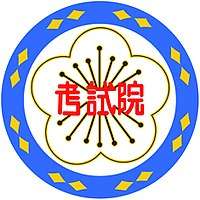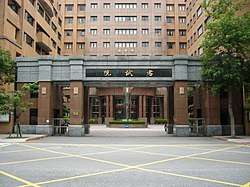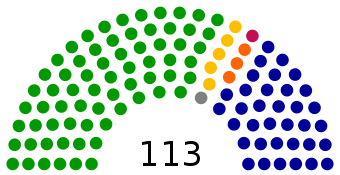Examination Yuan
|
考試院 Kǎoshì Yuàn (Mandarin) Kháu-sṳ Yen (Hakka) | |
 Logo | |
 | |
| Agency overview | |
|---|---|
| Formed | January 1930 |
| Jurisdiction | Republic of China (Taiwan) |
| Headquarters | Wenshan, Taipei |
| Agency executives |
|
| Website |
www |
| Examination Yuan | |||||||||||||||||||||||||||
| Chinese | 考試院 | ||||||||||||||||||||||||||
|---|---|---|---|---|---|---|---|---|---|---|---|---|---|---|---|---|---|---|---|---|---|---|---|---|---|---|---|
| Literal meaning | Court of Examinations | ||||||||||||||||||||||||||
| |||||||||||||||||||||||||||
 |
|---|
| This article is part of a series on the politics and government of the Republic of China |
|
Leadership |

|
|
Other branches |
|
Related topics |
|
|
The Examination Yuan (Chinese: 考試院; pinyin: Kǎoshì Yuàn; Wade–Giles: K'ao3-shih4 Yüan4) is in charge of validating the qualification of civil servants in the Republic of China (Taiwan). It is one of the five government branches ("yuans") of the Government of the Republic of China.
As a special branch of government under the Three Principles of the People formulated by Sun Yat-sen, it may (retrospectively) be compared with the European Personnel Selection Office of the European Union or the Office of Personnel Management of the United States of America. The Examination Yuan is based on the old Imperial examination system used in Imperial China.
History
After the end of Northern Expedition in 1928, the Nationalist Government set up the preparatory office of the Examination Yuan in October 1928 in which the organic law was promulgated. In May 1929, the headquarter of Examination Yuan was inaugurated at Kuankung and Yueh Fei Temple in Nanking. In January 1930, the Examination Yuan and its subordinates Examination Committee and Ministry of Civil Service were formally established.
In December 1937, the headquarter was relocated to Chongqing during the Second Sino-Japanese War. In January 1950, the headquarters were relocated temporarily to Taipei Confucius Temple in Taiwan after the Chinese Civil War. In December 1951, the headquarters were moved to Muzha District, Taipei. In March 1990, the Yuheng Building of the Yuan was inaugurated.[2]
Organizational structure
- Counselors
- Secretariat
- First Division
- Second Division
- Third Division
- Editing and Compilation Office
- Information Management Office
- Secretary Office
- Personnel Office
- Accounting Office
- Statistics Office
- Civil Service Ethics Office
- Petition and Appeals Committee
- Legal Affairs Committee
- Research and Development Committee[3]
Ministries
- Ministry of Examination (考選部)
- Ministry of Civil Service (銓敘部)
Commissions
- Civil Service Protection and Training Commission (公務人員保障暨培訓委員會)
- Public Service Pension Fund Supervisory Board (公務人員退休撫卹基金監理委員會)
See also
References
External links
| Wikibooks has a book on the topic of: Annotated Republic of China Laws/Additional Articles of the Constitution of the Republic of China/Article 6 |
| Wikimedia Commons has media related to Examination Yuan. |

